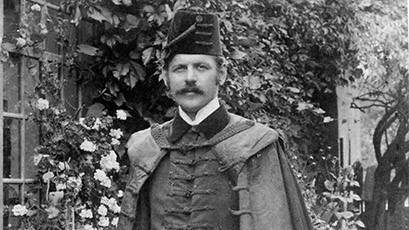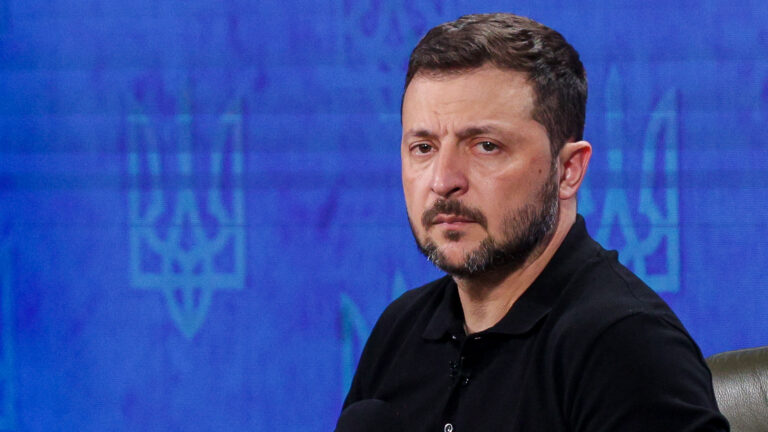The following is a translation of an article originally published on Magyar Nemzet.
A president, an advocate general, and five judges—all members of the Open Society network—are behind the infamous EU Court ruling that imposed a HUF 80 billion general (and HUF 200 million daily) fine on Hungary for not letting in illegal migrants. They are those ‘grey officials’ whose decisions affect all our lives, yet we do not know much about them. Nevertheless, the Luxembourg body is the real EU ‘deep state’: although less visible than the Commission or the EP, all the more important and subtle in EU decision-making. When empire-building slows down or stops, it is this court that pushes it back in—whether on federalization, gender issues, or migration.
The President of the Court, who is actually a stealth legislator, Belgian Koen Lenaerts, threatened Hungary with expulsion from the EU (!) in the migration case that was a precursor to the current decision; his colleague, Estonian Advocate General Priit Pikamäe, regularly submits proposals condemning Hungary—a possible explanation for this is his strong left-liberal network of connections. And the five judges: the French judge Bonichot, the Cypriot Lycourgos, the Croatian Rodin, the Italian Rossi, and, last but not least, the Romanian Spineanu-Matei? Well, let us put it this way: George Soros’ theory of an open society has convinced them too that border protection is an unnecessary luxury for nation states that are already ‘on the scrap heap of history’.
Commission. Parliament. Council. The media bombard us daily with these words when they talk about the European Union. After the EP elections, at the start of the Hungarian Presidency of the Council, a few months before the next Commission is set up, it is not so surprising. Especially when you consider the number of challenges facing the EU and their weight.
The tasks, legislative, and decision-making roles of these three EU institutions are not easy to understand, even for the initiated. Nevertheless, their functioning is well visualized, the leaders and representatives of the institutions impersonating them: we see them coming and going, making statements, and voting in Brussels.
However, there is a lesser-known but in many ways more influential pillar of the EU’s institutional system than the three institutions: the Court of Justice of the European Union, which is quietly but steadily building an ever closer union.
An Invisible Judicial Legion?
Its members are not in the public eye, and their decisions, which have a major impact on the daily lives of citizens, are not accountable to the electorate: their legitimacy is indirect, their responsibility is obscure.
Most of them have been to one (or rather all) of the EU institutions before landing on the judgment seat as a result of the so-called revolving door effect—as ‘happened’ to the judges who prosecuted Hungary.
They are the ‘noblemen’ of the legal aristocracy, the high functionaries of the European deep state. They are invisible. They are untouchable. They are irremovable.
For decades, their mission has been clear: if the process of EU integration stalls, if the electorate says no to a European constitution or a United States of Europe, the EU Court of Justice will come and move the stalled process forward. The Court’s disguised political objective as professional is to become the engine of federalization: if other bodies cannot legislate properly, it will ‘solve’ the problem by stealth legislation, which they call ‘law enforcement’. It is hardly part of the academic lore, but the fact is that the much-vaunted principle of the priority of EU law—that where EU law and national law conflict, the EU is ‘right’—has been developed by the Court of Justice and never enshrined in the EU Treaties.
And while the EU judges who daily ‘reveal’ progressive principles such as these are unknown, they are predictable in one respect: whether on migration, gender issues, the rule of law, or federalism, they consistently represent and enforce the political agenda of the open society. Of course, there are always one or two mavericks, who get the insignificant proceedings. But you cannot go wrong in political matters. As Hungarian jurist and political scientist Béla Pokol, who regularly discusses the supremacy of the judicial elite and the juristocracy, says: ‘When a substantial decision has to be made, presumably they always look to make sure that the deciding Judicial Council majority is “the puppy of their dog”—thus, there is no independence in relevant cases.’
Not only politically, but also legally, they can do almost anything—because there is no one to hold them to account, no superior body, no appeal forum, while they have enormous power over us.
The human rights fundamentalist commissary of the open society network in Hungary, the Helsinki Committee, puts it like this: ‘Although many people are not aware of it, the judgments of the Court of Justice of the European Union have a direct impact on the lives of hundreds of millions of EU citizens, including our own.’
One of their most recent judgments is well known, and the immediate impact does not remain below either: on 13 June, they fined Hungary almost eighty billion forints for ‘violating refugee rights’ (that is, border protection), and ordered Hungary to pay an additional two hundred million forints every day that ‘it failed to fully comply with its obligation to provide access to the asylum procedure’. (This amounts to roughly 40 million forints per migrant in terms of the number of illegal border crossing attempts this year!)
And yes: we are inclined to believe that the verdict was delivered by a faceless bureaucratic body, an institution in the Babel of Brussels, where almost no people work, but some ethereal creatures, far removed from everyday life.
The Ivory Tower Drawn
However, the reality is that EU judges are not the professionals of the ‘faceless army of excellence’, not the best and the brightest among us, but indeed
they are the very definable soldiers of George Soros’ ‘invisible legion’, who have now fully occupied the ivory tower of the judiciary,
punishing at-will states with conservative, sovereignist, or anti-immigration governments.
Let us see the members and leaders of the EU Court of Justice who imposed this unprecedented punishment on Hungary. First of all, it is worth highlighting Koen Lenaerts, the President of the Court, for two reasons: on the one hand, he is the one appointing the judges who hear each case—who, even according to Pokol, knows exactly the political preferences and biases in each of the judges’ chambers—, and on the other hand, his anti-Hungarianism is almost comparable to that of his compatriot Guy Verhofstadt. In the earlier transit zone case, he said that ‘if one really challenges the Court’s decision, it means the end of its membership’.
The other mastermind is Priit Pikamäe, the Estonian Advocate General: in practice, these two persons write and present the motions on which decisions are based—from which the judges rarely deviate in their decision-making process. That is what happened this time, too. Pikamäe, by the way, was formerly head of the Estonian Supreme Court, a position nominated by his mentor, the then ‘social-democratic’ president of the country, Toomas Hendrik Ilves, who was a close friend of George Soros and was even a guest at his wedding. However, the mentored judge is not far from the open society network either, as Firewallgroup, a Hungarian watchdog forum, has previously emphasized. The Advocate General, who has previously tabled a number of other motions condemning Hungary, is also linked to one of the biggest scandals in the Estonian judiciary: the Supreme Court sanctioned the marriage of a Swedish homosexual couple in Estonia, despite the fact that prevailing Estonian law did not include same-sex marriage.
But Pikamäe is not the only one to blame for the
unprecedented punishment meted out to Hungary by the EU for its anti-immigration policies,
which were otherwise supported by the Hungarian electorate.
The panel of judges was chaired by Cypriot Constantinos Lycourgos, behind whose managerial mantle lies a hardened Sorosist predator. While Lycourgos swapped his government appointments in Cyprus for a judgeship in Luxembourg, he never distanced himself from the network: he is now a CJEU judge and has taken notes on a study published by the Friedrich Ebert Stiftung, which also works with the German social democratic foundation Open Society Foundations (OSF), detailing how environmental NGOs can ‘access’ judicial decision-making. Lycourgos is, of course, a long-standing advocate of the ‘constitutional dialogue’ on the EU rule of law (in the Brussels newspeak, this is indoctrination): in Cyprus, he mentored a student group on such issues, gave regular lectures on Article 7 procedures—and, not least, has been involved in several migration decisions condemning Hungary in recent years, from transit zones to the STOP SOROS Legislative Package.
Another member of the panel in the current case is Jean-Claude Bonichot of France, who not only last year—together with the other members of the panel discussed in this article—condemned Hungary in a similar case on ‘making international protection inaccessible’ but was also part of the 2017 migration quota lawsuit. Bonichot, who has spoken of his federalist visions in numerous interviews, also recently proudly declared that the Court of Justice of the European Union is the most powerful body of its kind in the world. It was perhaps out of this arrogance that he expressed his indignation that some Member States dared to question the priority of EU law, which he said was being carefully crafted by the Court itself, calling it an ‘effective mechanism’ that the body could impose a heavy financial burden on ‘reluctant’ countries.
Having worked in both the EP and the Commission, Italian Lucia Serena Rossi was EU policy adviser to the left-wing government of Matteo Renzi from 2014 to 2017 and was nominated as an EU judge in 2018 by a left-wing prime minister. Rossi is a real ‘watchdog’: she criticized Prime Minister Viktor Orbán already in a 2015 article stressing the need to be ‘vigilant’ on the rule of law. She has explicitly called for more powers for the Commission and, like Lenaerts and many left-wing MEPs, has called for the exclusion of ‘non-compliant’ Member States. The icing on the cake is that on 6 December 2021, he gave a lecture at George Soros’ activist training course at CEU on Values, Rights, and Principles in EU Law.
The Croatian judge Sinisa Rodin graduated in 1992 from the University of Michigan, which is also supported by OSF, and was a visiting scholar at Harvard from 2001 to 2002 within the framework of the Fulbright Programme, also in frequent cooperation with OSF, before becoming a visiting professor at Cornell Law School in 2012, to which the Soros family donated more than 250,000 dollars between 2016 and 2021. Rodin also repaid his kindness by coming to lecture at CEU.
Last but not least, the fifth member of the Council that is (also) now condemning Hungary is the Romanian Octavia Spineanu-Matei, whose father was a judge in the party state of Nicolae Ceausescu. His daughter was nominated to the Court of Justice of the European Union by former Justice Minister Raluca Alexandra Pruna, a former CEU student, founder, and later president of the Romanian branch of Transparency International—perhaps because Spineanu-Matei was a strong advocate of sensitizing judges as head of the Judicial Training Institute.
The Conspiratorial Reality
And, lo and behold, the above life paths lead directly to the making of judgments that are pleasing to open society.
For many years now, sometimes together, sometimes separately, these judges
have been ruling against Hungary and others concerning migration.
Without being exhaustive, as indicated above, last year, for example, the same Council found a violation of the law because Hungary allowed asylum applications to be submitted at diplomatic missions—or, earlier, because of the transit zone procedure. But Bonichot and Rodin also participated in the judgment in which the Luxembourg panel rejected the Hungarian and Slovak appeals against the quota system, and they have excelled on other issues, too: as well as condemning our country for daring to punish NGO assistance to illegal border crossings, they have forced Bulgaria to recognize the parenthood of a same-sex couple, even though Bulgarian law does not allow it.
So it all adds up in the end:
an ideology that proclaims itself open, but in fact aims at a very closed imperial structure; a court that fits well within that structure, seeking unlimited power; political activist judges who move within the ideology, legislating instead of law enforcement; and a network that plans to build a United States of Europe by embracing all of these, without nations, states, and borders, but with a ‘dynamic’ interpretation of asylum, ‘accessible’ international protection, and many migrants. No, I do not believe in conspiracy theories. But I do see conspiracy practice here.
Click here to read the original article.








